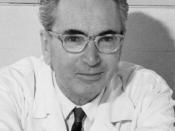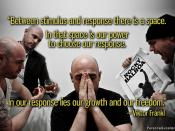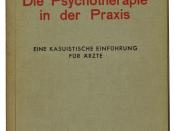In September of 1942, a young doctor, his new bride, his mother, father, and brother, were arrested in Vienna and taken to a concentration camp in Bohemia. It was events that occurred there and at three other camps that led the young doctor -- prisoner 119,104 -- to realize the significance of meaningfulness in life.
One of the earliest events to drive home the point was the loss of a manuscript -- his life's work -- during his transfer to Auschwitz. He had sewn it into the lining of his coat, but was forced to discard it at the last minute. He spent many later nights trying to reconstruct it, first in his mind, then on slips of stolen paper.
Another significant moment came while on a predawn march to work on laying railroad tracks: Another prisoner wondered outloud about the fate of their wives. The young doctor began to think about his own wife, and realized that she was present within him:
The salvation of man is through love and in love.
I understood how a man who has nothing left in this world still may know bliss, be it only for a brief moment, in the contemplation of his beloved. (1963, p. 59)
And throughout his ordeal, he could not help but see that, among those given a chance for survival, it was those who held on to a vision of the future -- whether it be a significant task before them, or a return to their loved ones -- that were most likely to survive their suffering.
It would be, in fact, the meaningfulness that could be found in suffering itself that would most impress him:
(T)here is also purpose in that life which is almost barren of both creation and enjoyment and which admits of but...


